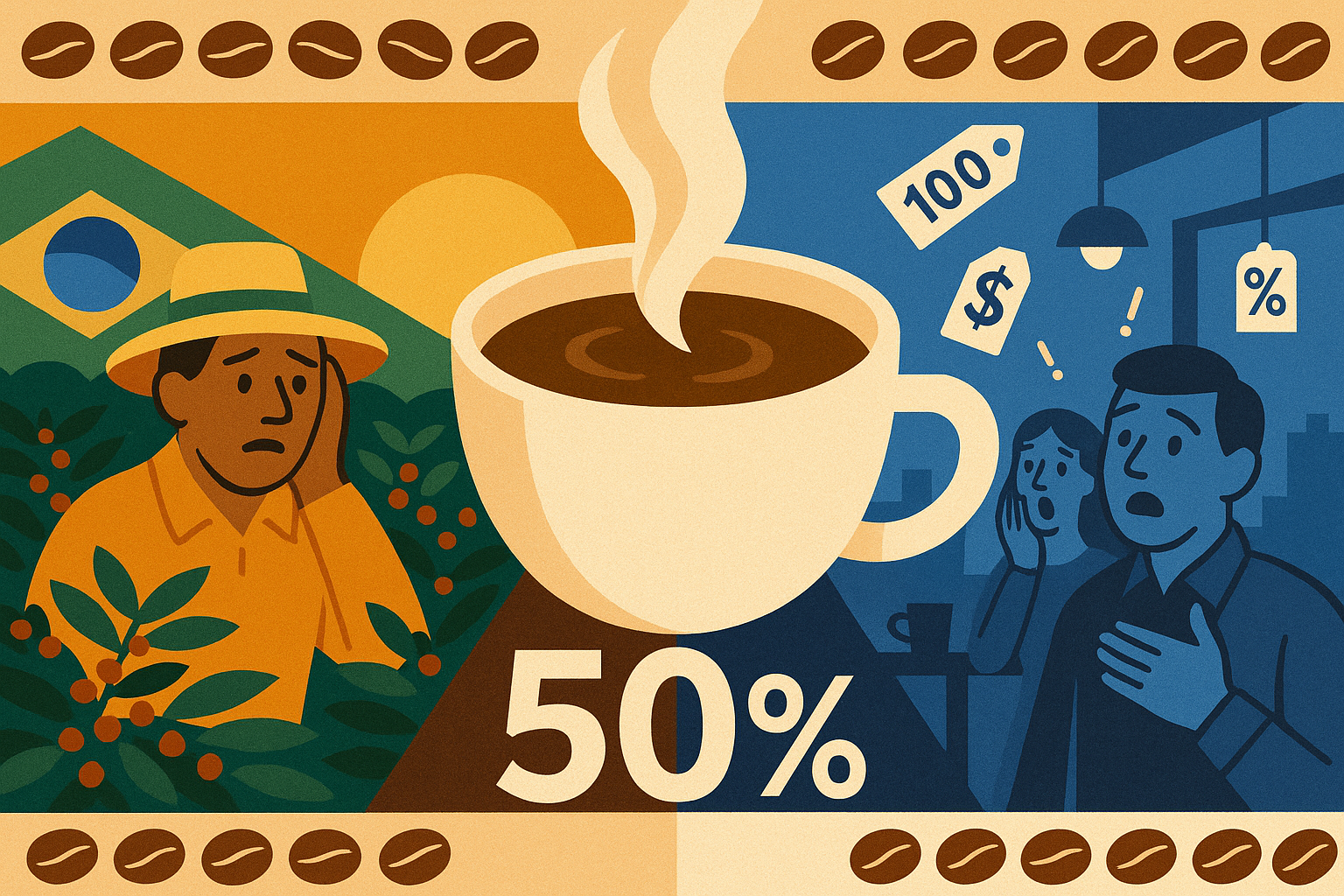How a Brazilian Political Trial Sparked the “Coffee Shock” of 2025
When Your $8 Cup Becomes $12
Monday morning, July 21, 2025. At Blue Bottle Coffee near Union Station in Washington, D.C., 27-year-old Nika Finkelstein manages a wry smile.
“These days, buying coffee out is basically a luxury item. I make it at home most of the time. When I do splurge, it’s drip coffee, not a latte. Even that’s expensive though.”
On the very day she spoke these words, President Donald Trump announced a 50% tariff on all Brazilian imports. Brazil—the world’s largest coffee producer and source of about 30% of U.S. coffee imports. This decision would deliver another blow to already soaring coffee prices.
Tariffs as Political Retaliation
The reason for this tariff isn’t purely economic. In his public letter, President Trump explicitly stated it was retaliation for the “witch hunt” prosecution of former Brazilian President Jair Bolsonaro, who faces charges of masterminding a coup to overturn his 2022 election loss.
“It’s a decision that has no winners,” says Marcos Matos, General Director of Brazil’s Coffee Exporters Council (CECAFÉ). “The North American consumer will be burdened, and anything that impacts consumption is bad for the flow of trade, bad for industry, and bad for the development of producing and consuming countries.”
Small Roasters’ Desperation
At Lost Sock Roasters in a small industrial area of Washington, D.C., the nutty, inviting smell of roasting coffee hangs heavy in the air. Co-founder Jeff Yerxa shakes his head in dismay.
“After nearly a decade running this company, I can’t even smell it anymore,” he laughs. “But something else is grabbing my attention these days: tariffs.”
The baseline 10% tariff imposed in April was already a significant burden for small businesses. “In the past six months, we’ve been not only paying double what we used to be paying for the coffee, but 10% on top of that,” laments Vladimir Kagan of Chicago’s Sputnik Coffee Company.
A jump to 50% would be devastating.
Global Ripple Effects
The impact on Brazilian small-scale farmers is equally severe. In Porciuncula, Rio de Janeiro state, José Natal da Silva sits on the dry earth surrounded by his glossy green arabica coffee shrubs, sighing deeply.
“We’re sad because we struggle so much. We spend years battling to get somewhere. And suddenly, everything starts falling apart, and we’re going to lose everything. How are we going to survive?”
He often tends to his modest plantation in the middle of the night, sacrificing sleep to fend off pests. Now his precious crops, protected through countless sleepless nights, are about to become casualties of political gamesmanship.
The Perfect Storm for Coffee Prices
The timing couldn’t be worse. Climate change-induced droughts and frosts have already tightened global coffee supplies. Earlier this year, coffee bean futures hit all-time highs.
Yale Budget Lab estimates that the current U.S. average tariff rate stands at 20.6%, the highest since 1910. Adding a 50% tariff on Brazil would have incalculable effects on coffee prices.
“The average retail price for a pound of ground coffee was $8.13 in June, up more than $1 per pound since the start of the year,” according to Bureau of Labor Statistics data. With a 50% tariff fully passed on, prices exceeding $12 per pound become a real possibility.
The End of “Coffee Diplomacy”?
Ironically, coffee has long been a symbol of friendship between the Americas. According to USDA data, for every $1 of imported coffee in the U.S., $43 is created in the U.S. economy. Coffee accounts for 1.2% of U.S. GDP and supports 2.2 million jobs.
But now, this interdependent relationship is being weaponized for political purposes.
August 1st and Beyond
With tariffs set to take effect August 1st, there’s still room for negotiation. U.S. Agriculture Secretary Brooke Rollins mentioned the White House is considering exemptions for produce that can’t be grown in the U.S.—with coffee being a prime candidate.
Yet optimism is dangerous. Lavazza Chairman Giuseppe Lavazza warns this could mean “a lot of inflation” for the coffee industry.
Back at Blue Bottle Coffee in Washington, Nika concludes: “If tariffs make it even more expensive? Honestly, I might have to give up coffee altogether.”
Epilogue: A Bitter Aftertaste
July 2025 finds the world at a strange crossroads. After the Great Depression and World Wars of the last century, humanity supposedly learned the value of free trade. Yet now, even a cup of coffee has become a tool of political retaliation.
This “Coffee War” that neither Brazilian farmers nor American consumers wanted—its bitter aftertaste will linger long after any tariffs are lifted.
Your morning cup of coffee. It’s not just a beverage, but a symbol of our global economy’s complex interdependence. And now, that interdependence is being poisoned by politics.
Next time you drink coffee, remember the story in that cup. Think of the farmers sweating in Brazilian plantations. The passionate artisans in America’s small roasteries. And the lesson of how easily politics can destroy everyday life.
Sources:
- NPR: “Coffee prices to spike as Brazil faces 50% tariffs under Trump” (July 21, 2025)
- CNBC: “Trump’s tariffs on Brazil could make your coffee even more expensive” (July 10, 2025)
- Daily Coffee News: “Trump’s 50% Tariff on Brazilian Goods Could Make US Coffee Prices Soar” (July 10, 2025)
- World Coffee Portal: “US 50% tariff will undermine Brazil’s coffee industry on the global stage, analysts say” (July 18, 2025)
- AP/Fort Morgan Times: “Small Brazilian coffee producers fear for the future after Trump’s 50% tariff” (July 24, 2025)
- Coffee Intelligence: “How 50% US tariffs on Brazil could reshape coffee” (July 18, 2025)
- WTTW Chicago: “How New Tariffs on Brazil Could Impact US Coffee Companies, Consumers” (July 21, 2025)


